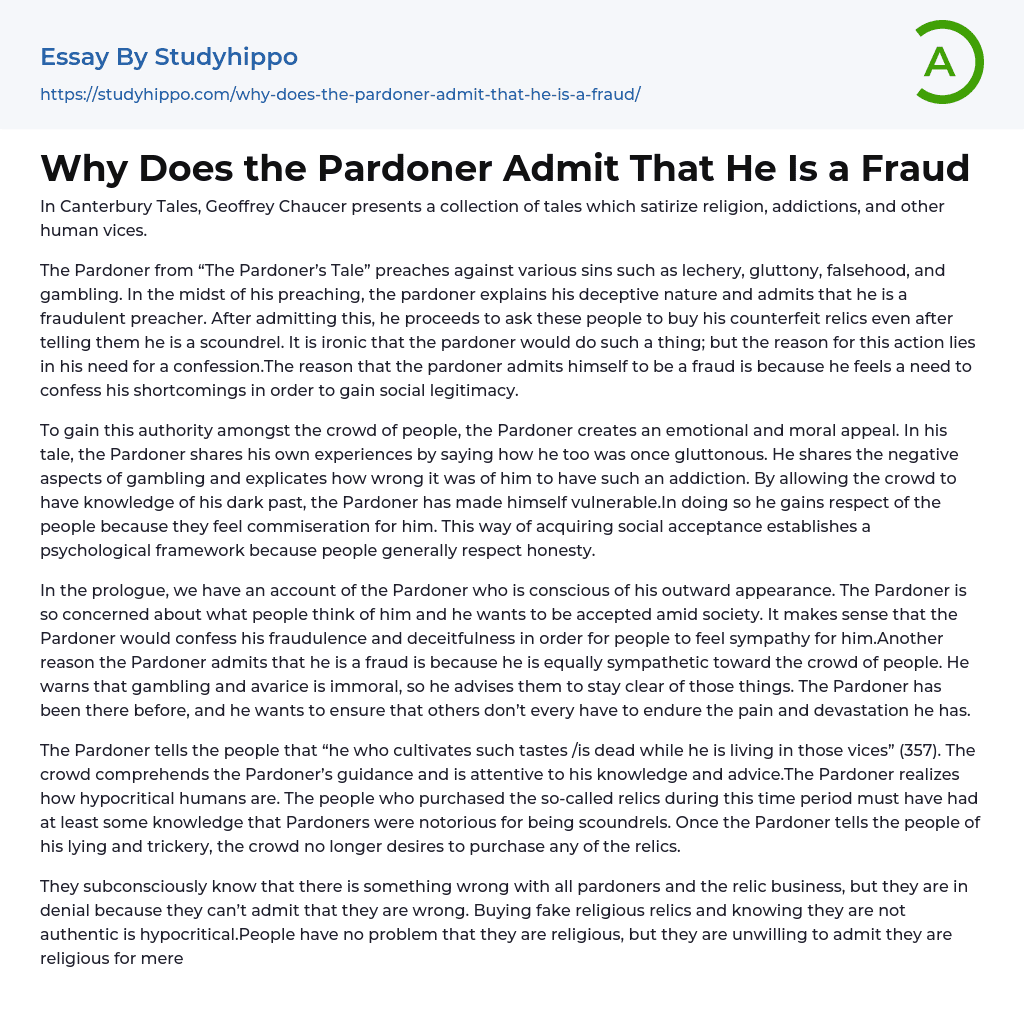In Canterbury Tales, Geoffrey Chaucer presents a collection of tales which satirize religion, addictions, and other human vices.
The Pardoner from “The Pardoner’s Tale” preaches against various sins such as lechery, gluttony, falsehood, and gambling. In the midst of his preaching, the pardoner explains his deceptive nature and admits that he is a fraudulent preacher. After admitting this, he proceeds to ask these people to buy his counterfeit relics even after telling them he is a scoundrel. It is ironic that the pardoner would do such a thing; but the reason for this action lies in his need for a confession.The reason that the pardoner admits himself to be a fraud is because he feels a need to confess his shortcomings in order to gain social legitimacy.
To gain this authority amongst the crowd of people, th
...e Pardoner creates an emotional and moral appeal. In his tale, the Pardoner shares his own experiences by saying how he too was once gluttonous. He shares the negative aspects of gambling and explicates how wrong it was of him to have such an addiction. By allowing the crowd to have knowledge of his dark past, the Pardoner has made himself vulnerable.In doing so he gains respect of the people because they feel commiseration for him. This way of acquiring social acceptance establishes a psychological framework because people generally respect honesty.
In the prologue, we have an account of the Pardoner who is conscious of his outward appearance. The Pardoner is so concerned about what people think of him and he wants to be accepted amid society. It makes sense that the Pardoner would confess his fraudulence and deceitfulness
in order for people to feel sympathy for him.Another reason the Pardoner admits that he is a fraud is because he is equally sympathetic toward the crowd of people. He warns that gambling and avarice is immoral, so he advises them to stay clear of those things. The Pardoner has been there before, and he wants to ensure that others don’t every have to endure the pain and devastation he has.
The Pardoner tells the people that “he who cultivates such tastes /is dead while he is living in those vices” (357). The crowd comprehends the Pardoner’s guidance and is attentive to his knowledge and advice.The Pardoner realizes how hypocritical humans are. The people who purchased the so-called relics during this time period must have had at least some knowledge that Pardoners were notorious for being scoundrels. Once the Pardoner tells the people of his lying and trickery, the crowd no longer desires to purchase any of the relics.
They subconsciously know that there is something wrong with all pardoners and the relic business, but they are in denial because they can’t admit that they are wrong. Buying fake religious relics and knowing they are not authentic is hypocritical.People have no problem that they are religious, but they are unwilling to admit they are religious for merely the reason of social acceptance. The Pardoner tells them of his fraudulence as a way to bring to the crowd’s attention that they live in hypocrisy. Just like the Pardoner has created a pathos and ethos effect, Chaucer has created a similar satirical result. By generating a collection of accounts during expeditions to Canterbury, Chaucer has made it
possible to share many morally and emotionally appealing stories.
Not only is the Pardoner an example of a typical deceptive priest during this time, but he is the symbol of human imperfection. Although hypocritical, the Pardoner’s underlying ambition is to aware people of the dangers of gambling, avarice, and dishonesty. He has experienced what it’s like to be avaricious, and he is sympathetic toward the crowd of people that he’s selling his relics to. The Pardoner pities dishonest humans, which is why he admits that he is a fraud.
- Values of Life essays
- Ethical dilemma essays
- Normative Ethics essays
- Virtue Ethics essays
- Belief essays
- Deontology essays
- Moral essays
- Virtue essays
- Work Ethic essays
- Adult essays
- Aggression essays
- Altruism essays
- Archetype essays
- Behavior essays
- Certainty essays
- Conformity essays
- Deception essays
- Human Behavior essays
- Human Sexuality essays
- Maturity essays
- Morality essays
- Obedience essays
- Procrastination essays
- Reinforcement essays
- Role Model essays
- Acceptance essays
- Age Of Enlightenment essays
- Child Observation essays
- Confucianism essays
- Conscience essays
- Critical Reflection essays
- Destiny essays
- Determinism essays
- Empiricism essays
- Environmentalism essays
- Epistemology essays
- Ethics essays
- Ethos essays
- Existence essays
- Existentialism essays
- Fate essays
- Free Will essays
- Functionalism essays
- Future essays
- Good And Evil essays
- Human Nature essays
- Individualism essays
- Meaning Of Life essays
- Metaphysics essays
- Natural Law essays




